 My Webster’s lists the verb form of “parrot” as “to repeat by rote.” That was pretty much my impression of what a parrot does, too. Then I met Alexander.
My Webster’s lists the verb form of “parrot” as “to repeat by rote.” That was pretty much my impression of what a parrot does, too. Then I met Alexander.
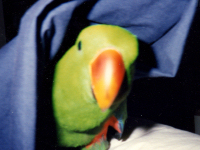
Alexander is a Vosmaerai eclectus, a species notable for sexual dimorphism more extreme than any other in the bird world; the females look so unlike the males that they were thought to be different species until the 20th Century. They’re native to New Guinea, but Alexander was hatched at Magnolia Bird Farm in Riverside, California. Maureen was there for it, and visited him constantly, and took him home with her five weeks later.
Alexander is a bit of a mess and something of a runt. His left shoulder is malformed and his wing won’t fully extend; he will never fly. He compulsively picks at himself (something wild parrots have never been observed to do) and has to wear a collar; otherwise, he will pull out highly vascular bloodfeathers and bleed to death. We hate the collar as much as Alexander does, and remove it whenever we think it will be safe — when he isn’t growing major feathers, which ain’t often.

Alexander seems about as smart as a three-year-old human being. I say this with some measure of objectivity, as someone with little prior experience of parrots and little sentimentality regarding them. I’ve seen him identify colors and objects from groups with no cueing from Maureen (that I observed, anyhow). He makes up games with consistent rules, usually involving the way an object is to be shared between him, me, and Mo, and gets flustered if you can’t figure out the rules.
And he talks. Oh, man, does he talk. I couldn’t say how large his vocabulary is, but it changes all the time, and one of the things that I’m still not used to is his ability to change inflection on words to convey different meaning, even though he hasn’t heard that word said that way before. He seems to understand that meaning changes with tone. He demonstrates this a lot around our neighbor Tiffany,  because he seems to have a crush on her. (He likes girls a lot better than boys anyhow, but Tiffany is a special case for him.) He says “Hi” to her when she’s in her backyard, in a special tone he reserves exclusively for her. It sounds like a guy at a bar radar-locking on a babe a couple of stools down. You can almost here the “well, hel-LO there.”
because he seems to have a crush on her. (He likes girls a lot better than boys anyhow, but Tiffany is a special case for him.) He says “Hi” to her when she’s in her backyard, in a special tone he reserves exclusively for her. It sounds like a guy at a bar radar-locking on a babe a couple of stools down. You can almost here the “well, hel-LO there.”
He also imitates environmental noises (train brakes were a favorite for a while), and caws at crows with some pretty funny results if they get a look at him. The crows tend to circle and get other crows to take a look as well, refusing to believe that the picture doesn’t match the sound. I got him to say “quack quack quack” for a while, and do some Warner Bros. cartoon sound effects. Sometimes he talks in his sleep. That takes getting used to. He’s awakened yelling from nightmares a few times too. He most definitely will put words together in different combinations to form sentences he has not heard before. There’s cognition there.
 Alexander loves to watch Powerpuff Girls and Dexter’s Lab. He laughs at appropriate moments (sometimes I hear it in stereo when he and Maureen laugh together — in identical voices). He has a thing for anything that drones, like a fan or a leaf blower, and will talk like mad when a drone is going. When Mo composes he sings along, in time and on key. I’ll never get used to hearing them do call-and-response, with Alexander basically playing “Simon” and getting annoyed if you don’t replicate his pattern (which he varies as he goes). At the end of this post are two recordings of Alexander accompanying Maureen (or vice versa, really), one a call-and-response, the other pretty much an improvised duet.
Alexander loves to watch Powerpuff Girls and Dexter’s Lab. He laughs at appropriate moments (sometimes I hear it in stereo when he and Maureen laugh together — in identical voices). He has a thing for anything that drones, like a fan or a leaf blower, and will talk like mad when a drone is going. When Mo composes he sings along, in time and on key. I’ll never get used to hearing them do call-and-response, with Alexander basically playing “Simon” and getting annoyed if you don’t replicate his pattern (which he varies as he goes). At the end of this post are two recordings of Alexander accompanying Maureen (or vice versa, really), one a call-and-response, the other pretty much an improvised duet.
Where Murdoc is a grumpy misanthrope, Alexander is a genuinely sweet character who shares things and likes to play with others. Both birds can be counted on to sound off whenever I have a business call or phone interview, which adds that special touch of professionalism. It’s also a fitting irony that I — who have written a rather large amount of fiction dealing with what are basically sentient animals, and who have made my opinion of furries pretty well known over the years — would end up living with animals that talk.
(This audio player app for WordPress sucks the rope-veined boy bone, so I’m including download links as well.)
Mo & Alexander – Duet
[audio:http://www.steveboy.com/audio/mo_and_alexander_-_duet.mp3]
Mo & Alexander – Call & Response
[audio:http://www.steveboy.com/audio/mo_and_alexander_-_call_and_response.mp3]
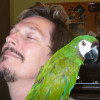 I don’t think you have to read me much to figure out that I’m not a very schmaltzy, widdle fwuffy bunny kinda guy, and I definitely deliberated before blogging about the birds (“The boys,” as we call them). But if
I don’t think you have to read me much to figure out that I’m not a very schmaltzy, widdle fwuffy bunny kinda guy, and I definitely deliberated before blogging about the birds (“The boys,” as we call them). But if  Murdoc is a
Murdoc is a 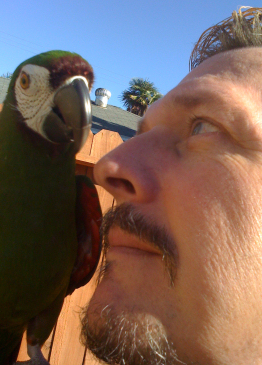 and walk across me to get to her. What woke me up most mornings when I stayed with Mo was Murdoc climbing the metal footboard. Mo would preen him and I would lie there imagining the damage his beak could do to me if he wanted it to.
and walk across me to get to her. What woke me up most mornings when I stayed with Mo was Murdoc climbing the metal footboard. Mo would preen him and I would lie there imagining the damage his beak could do to me if he wanted it to.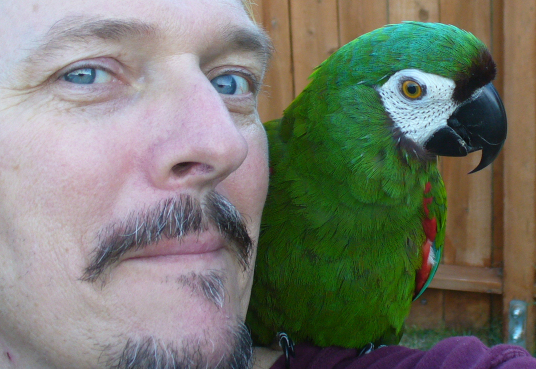 Murdoc is generally grumpy and not very social. (People and their pets, yah?) Often I feel sorry for him because he’s had a hard life and he’s pretty much broken. Mostly he just wants to be left alone. He loves me, though, and I’ve grown to love him. In fact love saved Murdoc, honestly.
Murdoc is generally grumpy and not very social. (People and their pets, yah?) Often I feel sorry for him because he’s had a hard life and he’s pretty much broken. Mostly he just wants to be left alone. He loves me, though, and I’ve grown to love him. In fact love saved Murdoc, honestly. Apart from the holiday traffic and wallblind idiocy of drivers whose ears go flat to their head as they stop in the middle of the road in utter hawkshadowed panic, this tends to be my favorite time of year. Besides the meridian at which I look back on the previous year and look forward to the next, for some reason it’s usually my busiest and most creative time of year. I always have more projects going on and more outlets for them.
Apart from the holiday traffic and wallblind idiocy of drivers whose ears go flat to their head as they stop in the middle of the road in utter hawkshadowed panic, this tends to be my favorite time of year. Besides the meridian at which I look back on the previous year and look forward to the next, for some reason it’s usually my busiest and most creative time of year. I always have more projects going on and more outlets for them. I think one reason I don’t post more often is that I have a sort of essay mentality when it comes to blogging. I tend to want to have a topic or a theme, and sometimes I’m either stuck for one or just too damned busy to put together something coherent or even god forbid artful.
I think one reason I don’t post more often is that I have a sort of essay mentality when it comes to blogging. I tend to want to have a topic or a theme, and sometimes I’m either stuck for one or just too damned busy to put together something coherent or even god forbid artful.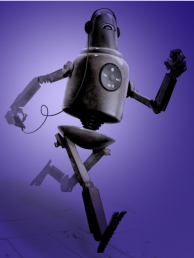
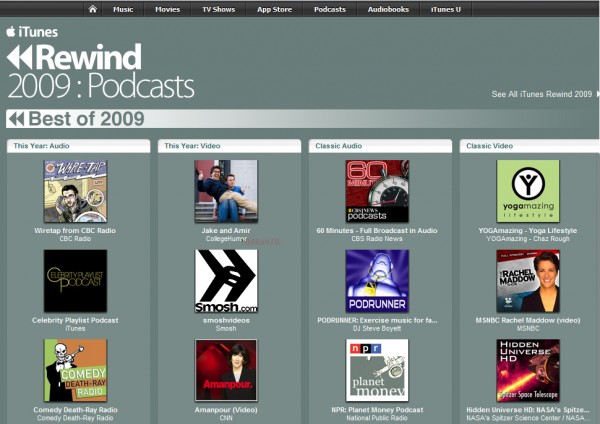
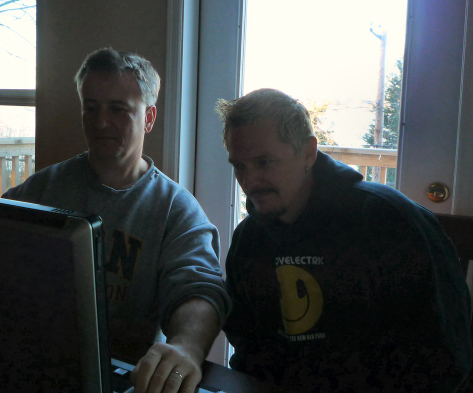 I’m in Seattle till Thursday, working with my friend Adrian Smith (polymath IT genius whiz who has also been a guest DJ on my
I’m in Seattle till Thursday, working with my friend Adrian Smith (polymath IT genius whiz who has also been a guest DJ on my 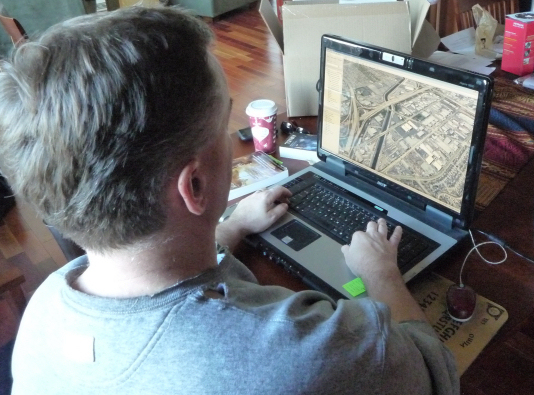 You’re even more able to use it because we have worked very hard to provide you with custom downloadable Google Earth maps that delineate locations, tour them, link to online pictures of landmarks, and include relevant text from the novels. You really can tour the Del Mar racetrack that dominates the first section of ELEGY BEACH. You really can fly the hang-gliding route in ARIEL. You really can go on the Goodyear blimp ride at appropriate altitude between Carson, California, and the Tejon Pass. The accuracy and detail astonish me. Maybe you’re young enough to take this stuff for granted. I’m old enough to be amazed by it.
You’re even more able to use it because we have worked very hard to provide you with custom downloadable Google Earth maps that delineate locations, tour them, link to online pictures of landmarks, and include relevant text from the novels. You really can tour the Del Mar racetrack that dominates the first section of ELEGY BEACH. You really can fly the hang-gliding route in ARIEL. You really can go on the Goodyear blimp ride at appropriate altitude between Carson, California, and the Tejon Pass. The accuracy and detail astonish me. Maybe you’re young enough to take this stuff for granted. I’m old enough to be amazed by it.

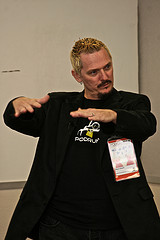
 Those of you using those free antiseptic wipes from dispensers outside grocery stores so that you will not expose yourself to cooties when you get your carts, please cut it the hell out. All you are doing is confirming to the rest of the world that America is a paranoid, germophobic, xenophobic culture.
Those of you using those free antiseptic wipes from dispensers outside grocery stores so that you will not expose yourself to cooties when you get your carts, please cut it the hell out. All you are doing is confirming to the rest of the world that America is a paranoid, germophobic, xenophobic culture.
 Dear Stephen,
Dear Stephen, Having fun on the second day of
Having fun on the second day of  Watching people gesture and pose as they talk on cell phones as if the person they’re speaking with can see them, it’s clear to me that areas of the visual cortex come into play when people use the phone. Put simplistically, you’ve got X amount of gray-matter RAM, and a certain portion of it is given over to visualization (real and imagined). As people seem to imagine the person they’re speaking to on the phone (there are probably good evolutionary reasons for this), some of the space given over to direct visual perception is being occupied.
Watching people gesture and pose as they talk on cell phones as if the person they’re speaking with can see them, it’s clear to me that areas of the visual cortex come into play when people use the phone. Put simplistically, you’ve got X amount of gray-matter RAM, and a certain portion of it is given over to visualization (real and imagined). As people seem to imagine the person they’re speaking to on the phone (there are probably good evolutionary reasons for this), some of the space given over to direct visual perception is being occupied.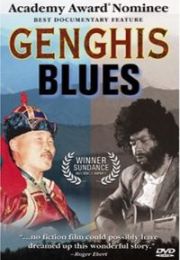 I watched the documentary
I watched the documentary  Yahoo Groups were a big new thing then, and I formed a group for Tuvan Throat Singing. It gradually got about 500 members, as I recall. Through this network I learned that a Tuvan group called
Yahoo Groups were a big new thing then, and I formed a group for Tuvan Throat Singing. It gradually got about 500 members, as I recall. Through this network I learned that a Tuvan group called  The signing at
The signing at 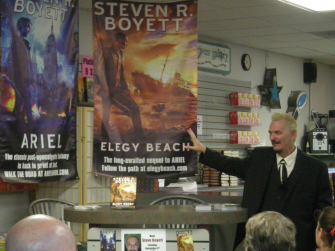
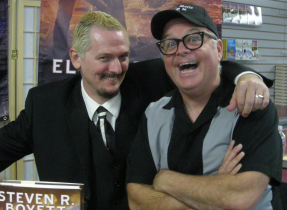
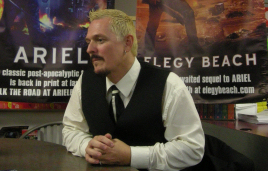

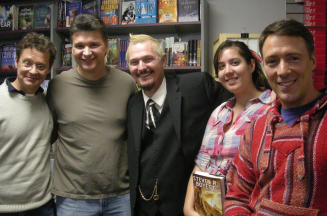
 I promised myself this blog was going to be an ongoing series of essays and conversations on a variety of topics — writing, science fiction & fantasy, authorship & intellectual property in the 21st Century, the remix as metaphor for the art of our age, occasional reports on events and the status of books & various projects. What I promised myself it would not be is a billboard for me and my work. We already get more than enough spam in our lives without me adding to the heap, I think.
I promised myself this blog was going to be an ongoing series of essays and conversations on a variety of topics — writing, science fiction & fantasy, authorship & intellectual property in the 21st Century, the remix as metaphor for the art of our age, occasional reports on events and the status of books & various projects. What I promised myself it would not be is a billboard for me and my work. We already get more than enough spam in our lives without me adding to the heap, I think.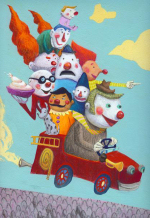 Several websites have asked for essays from me in conjunction with the release of Elegy Beach. Naturally I’m only too happy to oblige! But even though I’m perfectly comfortable promoting my work, rather than just write some long commercial for my new book I think it’s fun to use these as opportunities to talk about my approach to my work — how I do what I do. (Or, at least, how I think I do what I think I do.)
Several websites have asked for essays from me in conjunction with the release of Elegy Beach. Naturally I’m only too happy to oblige! But even though I’m perfectly comfortable promoting my work, rather than just write some long commercial for my new book I think it’s fun to use these as opportunities to talk about my approach to my work — how I do what I do. (Or, at least, how I think I do what I think I do.) So with one book coming out and another one just sent off to the agent, even though I’m fairly busy with promotion-related stuff (November is gonna be nuts), my attention immediately turned to DJing and designing my wife’s music website. I mean at around 4 a.m. on Sunday I literally packed up the new novel to mail off to my agent the next morning and then did a new Podrunner mix. The next day I began the laborious and detail-intensive nonsense involved in upgrading my DJ rig and getting new controllers.
So with one book coming out and another one just sent off to the agent, even though I’m fairly busy with promotion-related stuff (November is gonna be nuts), my attention immediately turned to DJing and designing my wife’s music website. I mean at around 4 a.m. on Sunday I literally packed up the new novel to mail off to my agent the next morning and then did a new Podrunner mix. The next day I began the laborious and detail-intensive nonsense involved in upgrading my DJ rig and getting new controllers. I finished the massive revision of my next novel over the weekend and sent it off to my agent yesterday. Now maybe I can go back to some kind of normal schedule (one that involves more than three hours’ sleep a day) and actually do some useful things around the house. My wife deserves some kind of medal. Mo’s been running interference between me and the world whhile I dig through this mountain. But I’m through and the book is off.
I finished the massive revision of my next novel over the weekend and sent it off to my agent yesterday. Now maybe I can go back to some kind of normal schedule (one that involves more than three hours’ sleep a day) and actually do some useful things around the house. My wife deserves some kind of medal. Mo’s been running interference between me and the world whhile I dig through this mountain. But I’m through and the book is off.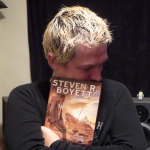 This came in today. It’s the final publication hardcover of Elegy Beach.
This came in today. It’s the final publication hardcover of Elegy Beach.
 I can’t write a story or novel unless I have a title. In fact I have a folder with a list of titles that have come to me (“The Placebo Plague” — c’mon, don’t you want to know what that’s about? I do). There’s nothing mysterious about it. In many ways the title is simply my perspective on the work. It lets me know how I see it. How I want it seen.
I can’t write a story or novel unless I have a title. In fact I have a folder with a list of titles that have come to me (“The Placebo Plague” — c’mon, don’t you want to know what that’s about? I do). There’s nothing mysterious about it. In many ways the title is simply my perspective on the work. It lets me know how I see it. How I want it seen. kes this not at all ideal is that we own parrots. Plural. A vosmaeri eclectus and a severe macaw. I love them dearly and often want to drown them. (I won’t go on about the birds themselves because whothehell wants to read yet another blog entry about someone’s pet?) You think only roosters crow at dawn, right? Nossir, all birds just love to celebrate every sunrise like they’re starring in some Cat Stevens ballad.
kes this not at all ideal is that we own parrots. Plural. A vosmaeri eclectus and a severe macaw. I love them dearly and often want to drown them. (I won’t go on about the birds themselves because whothehell wants to read yet another blog entry about someone’s pet?) You think only roosters crow at dawn, right? Nossir, all birds just love to celebrate every sunrise like they’re starring in some Cat Stevens ballad.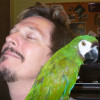 So for about the last month I’ve been a shuffling stumbling holloweyed thing who looks like he wants nothing more than to eat your brain. Other work is piling up. Daily chores are neglected. The rest of my life is piling up. But something in me insists on doing it this way.
So for about the last month I’ve been a shuffling stumbling holloweyed thing who looks like he wants nothing more than to eat your brain. Other work is piling up. Daily chores are neglected. The rest of my life is piling up. But something in me insists on doing it this way.






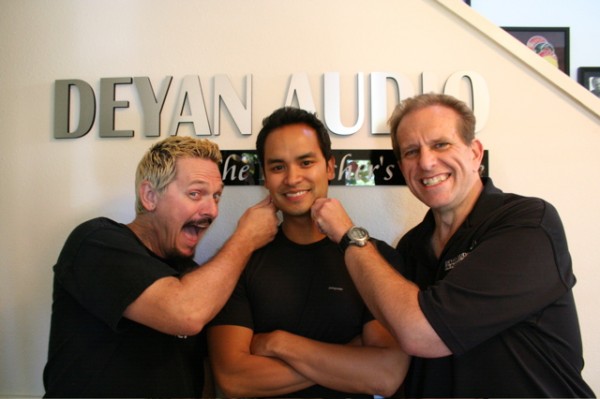
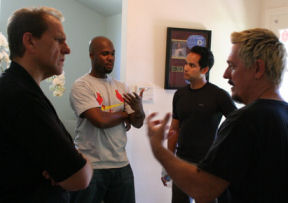
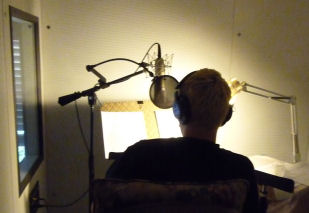 Ramon and JD (who, I should mention, are also offensively good-looking men) took off, and Bob went into the studio with me to record the Intro. Take 1: you choked on that one a little, Steve. Take two: Just relax. Take three: Stop moving around so much, okay? Take four: wow, you really suck major hose at this, don’t you, Boyett? (Bob never actually said any of those; he’s way too nice. )
Ramon and JD (who, I should mention, are also offensively good-looking men) took off, and Bob went into the studio with me to record the Intro. Take 1: you choked on that one a little, Steve. Take two: Just relax. Take three: Stop moving around so much, okay? Take four: wow, you really suck major hose at this, don’t you, Boyett? (Bob never actually said any of those; he’s way too nice. )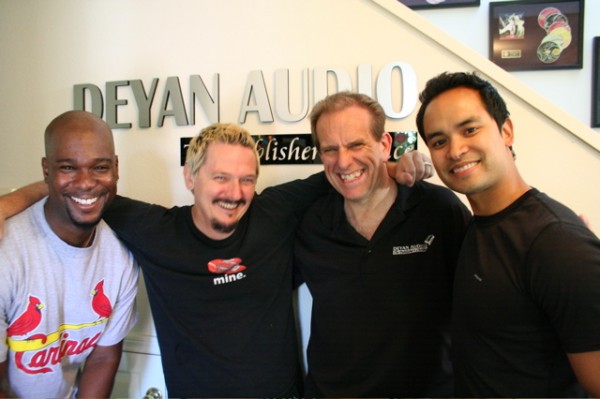


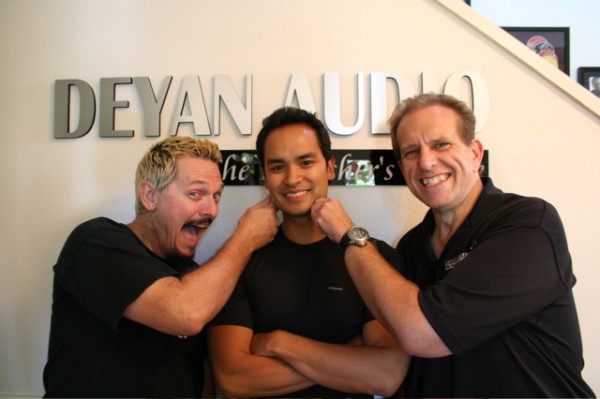
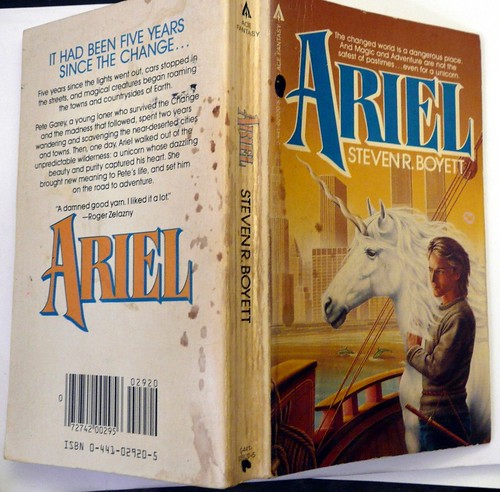
 So I’m out in the middle of shit nowhere in the northern Nevada desert exploring art projects on the playa one night at Burning Man with my friend Scott. We’re looking at this yurt that someone has set up. There’s nothing around it. Scott tells me he wishes he had a map of the Black Rock City so he could mark locations of some theme camps and art installations. (For a week the temporary Black Rock City that houses Burning Man is the fourth-largest city in Nevada, dontcha know.)
So I’m out in the middle of shit nowhere in the northern Nevada desert exploring art projects on the playa one night at Burning Man with my friend Scott. We’re looking at this yurt that someone has set up. There’s nothing around it. Scott tells me he wishes he had a map of the Black Rock City so he could mark locations of some theme camps and art installations. (For a week the temporary Black Rock City that houses Burning Man is the fourth-largest city in Nevada, dontcha know.)
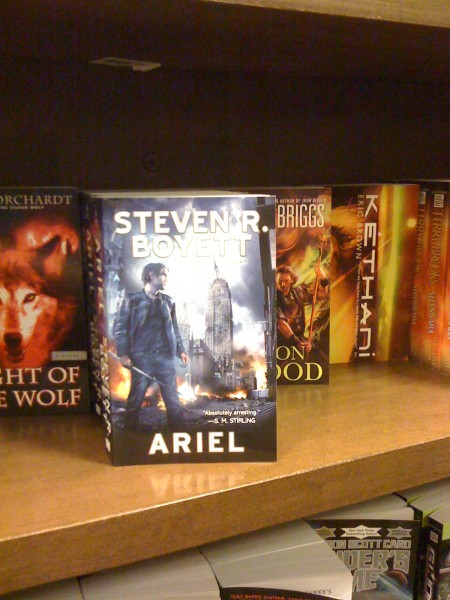 ARIEL is officially released today. Cory Doctorow, bless him, released a
ARIEL is officially released today. Cory Doctorow, bless him, released a 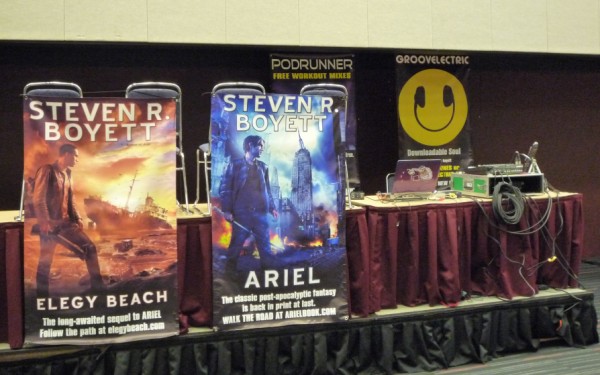
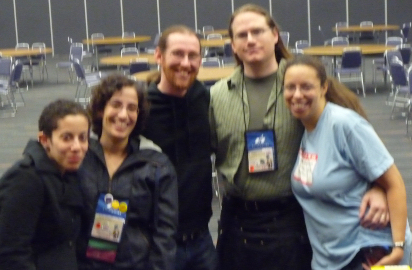
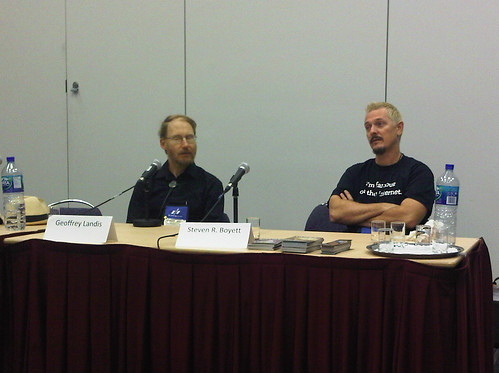
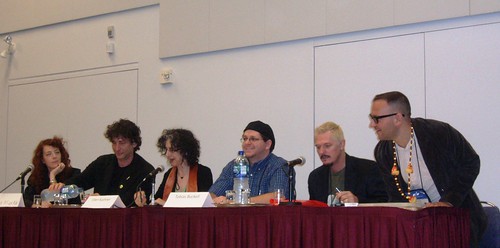
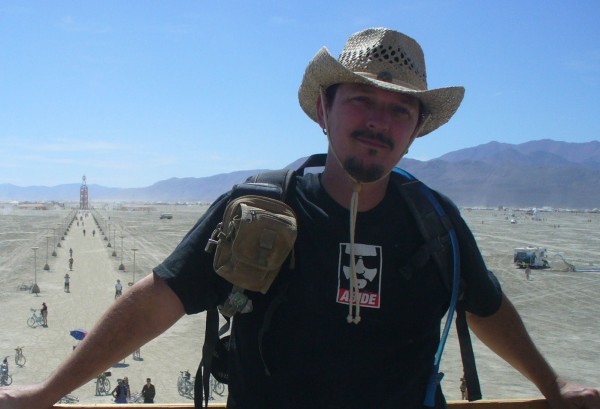 This will be my third year at the
This will be my third year at the